Civilising the Native , Educating the Nation Class 8 Worksheet History Chapter 6
| Table of contents |

|
| Multiple Choice Questions |

|
| Fill in the Blanks |

|
| True or False |

|
| Match the Following |

|
| Very Short Answer Questions |

|
| Short Answer Questions |

|
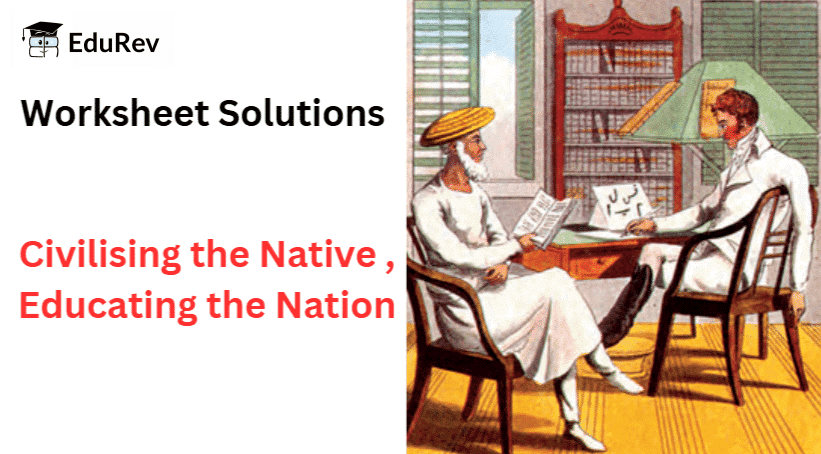
Multiple Choice Questions
Q1: Who was William Jones?
A) A British officer who criticized Orientalism
B) A linguist who studied Sanskrit and Persian
C) A scholar who supported Western education
D) A politician in British India
Ans: B) A linguist who studied Sanskrit and Persian
Q2: What was the primary aim of Macaulay's Minute of 1835?
A) To encourage Oriental learning
B) To promote English as the medium of instruction
C) To establish more vernacular schools
D) To abolish higher education
Ans: B) To promote English as the medium of instruction
Q3: Which institution was established in 1791?
A) Calcutta Madrasa
B) Hindu College
C) Santiniketan
D) Asiatic Society
Ans: B) Hindu College
Q4: What did Wood's Despatch of 1854 emphasize?
A) Promotion of Oriental learning
B) The need for moral education
C) Practical benefits of European learning
D) Establishment of more vernacular schools
Ans: C) Practical benefits of European learning
Q5: Which of the following was a criticism of the Orientalist approach?
A) It was scientifically rigorous
B) It was full of errors and non-serious
C) It respected Indian culture
D) It promoted local languages
Ans: B) It was full of errors and non-serious
Fill in the Blanks
Q1: The ________ was established by William Jones to study ancient Indian texts.
Ans: Asiatic Society
Q2: The English Education Act was introduced in the year ________.
Ans: 1835
Q3: Mahatma Gandhi believed that colonial education created a sense of ________ in Indians.
Ans: Inferiority
Q4: Tagore's institution was named ________ which means 'abode of peace'.
Ans: Santiniketan
Q5: The British aimed to transform students into ________ subjects.
Ans: Good
True or False
Q1: Thomas Babington Macaulay supported the promotion of Oriental learning.
Ans: False
Instead, he advocated for the promotion of Western education and English as the medium of instruction in India.
Q2: William Adam reported that there were over 1 lakh pathshalas in Bengal and Bihar.
Ans: True
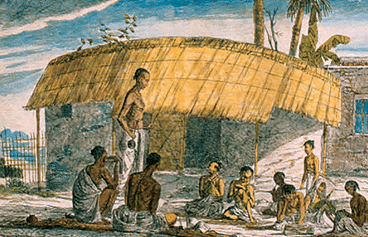 Village Pathshala
Village Pathshala
Q3: The British government invested heavily in missionary education from the beginning.
Ans: False
Instead, they focused on establishing institutions that promoted their administrative and economic goals, such as schools teaching English and Western sciences.
Q4: Mahatma Gandhi believed in the importance of teaching English to Indians.
Ans: False
He believed that education should be imparted in the mother tongue to ensure that Indians retained their cultural roots.
Q5: Rabindranath Tagore emphasized rigid discipline in his educational philosophy.
Ans: False
Tagore rejected the idea of rigid discipline in education. He believed in a free and natural learning environment, where students could explore their creativity and develop a love for nature.
Match the Following
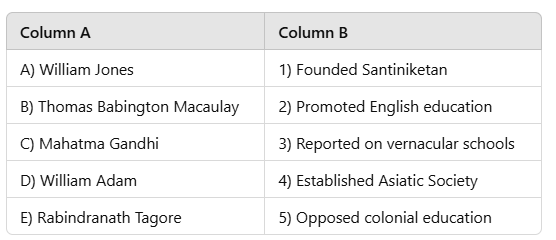
Ans:
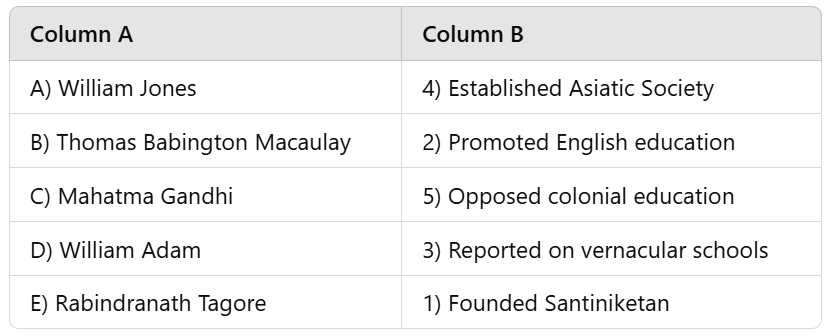
Very Short Answer Questions
Q1: Who was William Jones and what did he contribute to Indian education?
Ans: William Jones was a linguist and judge who studied Sanskrit and established the Asiatic Society of Bengal.
Q2: What did Thomas Babington Macaulay advocate regarding Indian education?
Ans: Macaulay advocated for the promotion of English education over Oriental learning to civilize Indians.
Q3: What was the main purpose of Wood's Despatch in 1854?
Ans: Wood's Despatch aimed to outline educational policies promoting European learning and improving moral character.
Q4: How did Mahatma Gandhi view English education?
Ans: Gandhi believed English education created a sense of inferiority and distanced Indians from their culture.
Q5: What was Rabindranath Tagore's vision for education at Santiniketan?
Ans: Tagore envisioned a creative and free learning environment in harmony with nature, encouraging self-exploration.
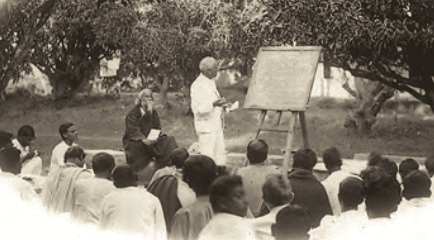 A class in Santiniketan
A class in Santiniketan
Short Answer Questions
Q1: What was the main goal of British education in India?
Ans: The main goal of British education in India was to "civilize" the Indian people. The British wanted to teach Indians to be good subjects who followed British customs and values. They believed that by educating Indians, they could control them better and help them learn Western ideas.
Q2: Who was William Jones and what did he do in India?
Ans: William Jones was a British judge and linguist who came to India in 1783. He studied Indian languages like Sanskrit and Persian and began translating ancient Indian texts. He wanted to understand Indian culture and share it with others, believing that these texts held important knowledge about Indian society.
Q3: What did Thomas Babington Macaulay think about Indian knowledge?
Ans: Thomas Babington Macaulay believed that Indian knowledge was not as good as British knowledge. He thought that studying Eastern literature was not useful. Macaulay argued that Indians should learn English and Western ideas instead, as he believed this would help them become more civilized.
Q4: What was Wood's Despatch and what did it aim to do?
Ans: Wood's Despatch was an important document sent by the British government in 1854. It aimed to improve education in India by promoting European learning over Indian learning. It encouraged the establishment of schools and universities that taught Western subjects and aimed to make education practical and useful for trade and commerce.
Q5: How did Mahatma Gandhi view British education in India?
Ans: Mahatma Gandhi believed that British education made Indians feel inferior and disconnected from their own culture. He thought it was important for education to help people feel proud of their identity. Gandhi wanted education to focus on practical skills and teach in Indian languages, rather than in English, to connect better with the local culture.
|
69 videos|431 docs|46 tests
|
FAQs on Civilising the Native , Educating the Nation Class 8 Worksheet History Chapter 6
| 1. What is the main theme of the article "Civilising the Native, Educating the Nation"? |  |
| 2. How did colonial education affect the social structure of native communities? |  |
| 3. What role did language play in the education of the natives? |  |
| 4. Can you explain the concept of 'civilising mission' in the context of the article? |  |
| 5. What are the critiques of the educational policies implemented during the colonial period? |  |















